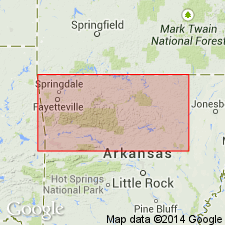
- Usage in publication:
-
- Marcella Formation
- Modifications:
-
- Named
- Dominant lithology:
-
- Shale
- Limestone
- AAPG geologic province:
-
- Arkoma basin
Summary:
Name applied to some Upper Mississippian (Chester) rocks in northern AR that were previously included in the Pitkin Limestone by some, and to the Pitkin Limestone and lower shale and limestone members of lower part of Morrow Formation by others. Conformably overlies Pitkin Limestone. Conformably underlies Cane Hill Member of Hale Formation. Type section is an exposure along Wallace Creek in NW1/4 sec 12, T13N, R9W, near Marcella, Stone Co, AR in the Arkoma basin. Consists of a basal sandstone--the Wallace Creek Shale Member, a black carbonaceous, siliceous shale, and an overlying thick, massive, gray to black limestone. The limestone is commonly 1-2 percent quartz sand, and in places is more than 50 percent quartz sand. The presence of quartz sand distinguishes it from the Pitkin which has no quartz sand. A few calcilutite and thin black shale beds present in upper part. Wallace Creek ranges between 0 to about 60 ft thick. The limestone part is 177 ft thick in measured type section. Isopach and lithofacies map. Isopach map shows formation thickening southward to more than 300 ft. Nomenclature chart. Cross section.
Source: GNU records (USGS DDS-6; Denver GNULEX).
For more information, please contact Nancy Stamm, Geologic Names Committee Secretary.
Asterisk (*) indicates published by U.S. Geological Survey authors.
"No current usage" (†) implies that a name has been abandoned or has fallen into disuse. Former usage and, if known, replacement name given in parentheses ( ).
Slash (/) indicates name conflicts with nomenclatural guidelines (CSN, 1933; ACSN, 1961, 1970; NACSN, 1983, 2005, 2021). May be explained within brackets ([ ]).

